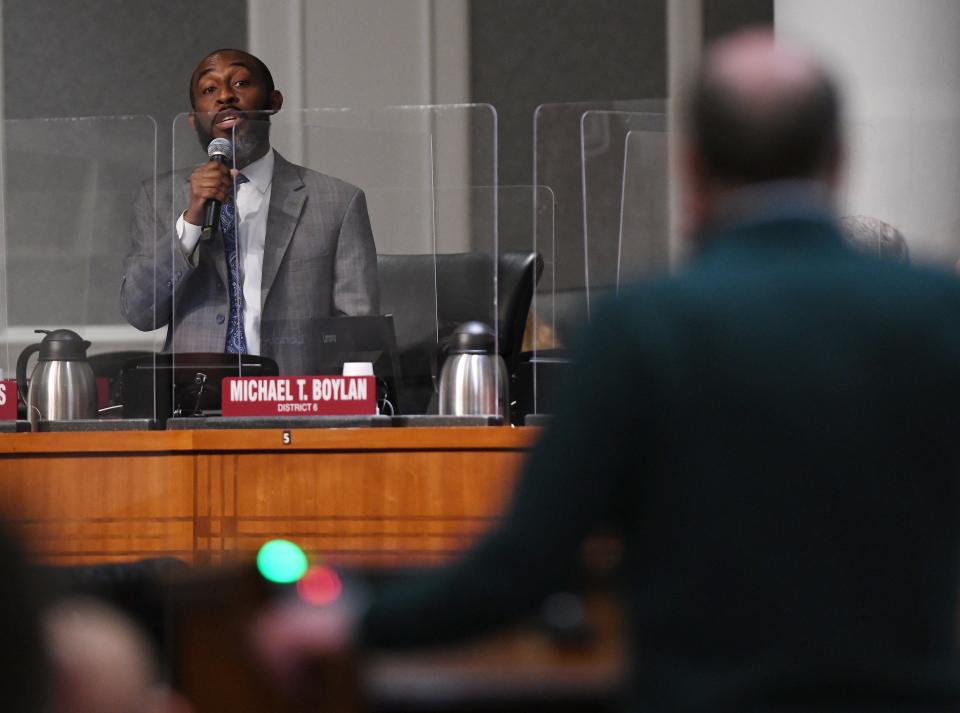Amid JEA privatization controversy, a City Council member received a mysterious job offer. A dark-money group may have been behind it.

This story was reported in partnership with Orlando Sentinel reporters Jason Garcia and Annie Martin. It is based on secret records obtained by the Orlando Sentinel and shared with the Times-Union, as well as other documents, information and interviews both newspapers obtained, conducted and shared.
A longtime friend phoned City Council member Garrett Dennis in mid-2019 to relay a peculiar offer: An obscure group advocating for marijuana decriminalization wanted to hire Dennis to lead it, a lucrative $250,000 job possibility that only came with one catch.
Dennis would have to leave the City Council to take it.
Money & Power: The secret origins — and public collapse — of the campaign to privatize Jacksonville’s electricity and water
More: Former JEA No. 2, an Aaron Zahn confidant, talks with prosecutors amid investigation
The potential offer struck Dennis, a marijuana decriminalization advocate who had filed legislation that spring, as suspicious. He asked a council aide to research the group that apparently wanted to hire him, ultimately finding it had no online presence.
Thinking it was a scam, Dennis blew off the offer and moved on. Neither Dennis nor his aide remember telling anyone about the encounter, and Dennis said he hadn't thought back on it until he was questioned about it this week by a reporter. "This wasn't even really much on our radar because there was so much going on," Taryn Roberts, his former council aide, recalled.
Dennis didn't know it at the time, but previously unreported details in secret records obtained by the Orlando Sentinel last month, and additional interviews by the Sentinel and the Times-Union, indicate that the odd job offer likely had little to do with genuine advocacy for medical marijuana.
Instead, the idea of a job offer was connected to Florida Power & Light, whose parent company, NextEra, offered $11 billion in 2019 to purchase JEA, Jacksonville's municipally owned electric, water and sewer utility. A job offer proposal with striking similarities to the one Dennis and others described originated in July of that year from employees at Alabama-based Matrix LLC, one of the consulting firms FPL hired to work on the company's behalf during the months-long and ultimately canceled JEA sale effort. JEA's board of directors voted that same month, in July, to allow the agency's former CEO to put the public utility up for sale.
Any transaction would have needed approval from the 19-member Jacksonville City Council, and Dennis was known to be one of the most vocal council critics of the divisive efforts by former JEA executives to privatize the agency.
Matrix records indicate the potential job could have paid as much as $180,000 plus $60,000 in travel and expenses — Dennis recalled being told $250,000. A partially redacted summary of an internal Matrix investigation, which was part of the cache of secret records delivered anonymously to the Sentinel last month, explicitly tied the job offer to Dennis' opposition to FPL's position on JEA. The proposal, the investigative summary concluded, was intended to provide an "opening" for Dennis to leave the City Council.
Florida Power & Light confirmed in a statement to the Times-Union and the Sentinel that employees at Matrix came up with the idea of offering Dennis a job advocating for medical marijuana, but the company's spokesman said it was "flatly rejected."
Joe Perkins, the owner of Matrix, denied through an attorney that he or any of his "legitimate staff" had any knowledge of such a proposal and suggested, if it were made, it was done by "rogue employees." Further, Perkins insisted he "made it clear" to Matrix staff "that the company would have no involvement in any projects related to the proposed sale of JEA," and that if any work was done, it was "against direct orders from Joe Perkins."
Both companies maintain they've done nothing wrong.
Yet a job offer idea still made its way to Dennis' ear. The council member was not the only person who remembered the potential offer. The intermediary who phoned Dennis to float the idea — Dwight Brisbane, a local consultant and friend of Dennis' — corroborated key details about the conversation in an interview, as do the internal Matrix records where reporters first learned about a plan to offer Dennis a job.
Statewide dark-money controversies

Even if the plan was never fully realized, the revelation it was even floated is remarkable in several respects:
• It shows that at least some of FPL's consultants were willing to entertain an extreme idea to manipulate the political process to win the highly coveted right to purchase JEA, one of the nation's largest public utilities with nearly 500,000 electric customers and nearly 400,000 water ratepayers in Northeast Florida. And it reveals behind-the-scenes maneuverings that were taking place even in the opening days of the months-long JEA sales effort.
Despite the work of a special City Council investigative committee, which had the power to issue subpoenas, the involvement of Matrix in FPL's bid was not previously known.
JEA deal: City Council investigative report links Mayor Lenny Curry to failed JEA sale
More: NextEra offered $11 billion to buy JEA during last year's sales negotiations
• The internal records and interviews indicate the proposal was tied to another behind-the-scenes effort to sway public opinion on a potential JEA sale, which began years before JEA executives put the utility on the market.
On paper, the purpose of the short-lived group "Fix JEA Now," which started in 2017, was to raise awareness about JEA's involvement in an expensive, years-behind-schedule project to build two new nuclear reactors near Waynesboro, Ga. The group was started by Deves Toon, the national field director for the National Action Network, a civil rights organization founded by the Rev. Al Sharpton in 1991.
But Times-Union and Sentinel reporting indicate Fix JEA Now and Toon were backed by money from groups controlled by employees at Matrix.
And it was Toon who asked Brisbane — the friend of Dennis — to float the potential job offer to the councilman, Dennis and Brisbane said in separate interviews about their recollections of the job offer.
Toon did not respond to multiple messages.
It's not clear how long Matrix had done JEA-related work for FPL. The utility acknowledged it was "aware that Matrix was paying Rev. Toon to support a number of polling and outreach efforts for multiple clients" and that FPL also "had knowledge of the Fix JEA Now organization." But FPL said it "did not have any involvement in or formation of the organization nor did we provide any funding for it."
• The players involved with the proposed job offer to Dennis are also tied to an even more sprawling elections controversy. Spoiler candidates were propped up by dark money groups to sway three Senate races — District 9 in Central Florida and South Florida’s districts 37 and 39 — last year in an effort to sap votes from the Democratic candidates and help Republicans retain control of the 40-member Florida Senate.
Internal records and interviews indicate employees at Matrix were planning to offer Dennis a job with Grow United Inc., a dark-money group that used money to support spoiler candidates in those races.
The "ghost" candidate controversy set off a wide-ranging criminal investigation by prosecutors in Miami, who secured a guilty plea from the independent candidate in District 37 and filed felony charges against Frank Artiles, a former Republican lawmaker accused of bribing the candidate to run. Artiles pleaded not guilty.
Neither FPL executives nor the consultants identified in the secret records have been accused of wrongdoing in that investigation.
The records and reporting by the Sentinel and Times-Union show the dark money reached into Northeast Florida and is connected to one of the most scandalous episodes in Jacksonville's recent history.
The 2019 effort by former JEA executives to privatize the agency sparked community outrage and ultimately set off a still-ongoing federal investigation into at least one of several controversies that arose during the sale: An effort by those former executives to craft a bonus plan that could have paid them millions if JEA had been sold to a private operator.
FPL said it has "cooperated and assisted the DOJ and the FBI with their continuing investigation of the JEA sale process."
It said efforts by the City Council's investigative committee found "no substantive evidence of coordination between members of the Jacksonville government and NextEra Energy."
"In fact, to our knowledge, neither NextEra Energy nor FPL are being investigated by the Department of Justice as part of its JEA sale process investigations. The DOJ has confirmed this, in writing, to our company."
Trouble at Matrix
Hard copies of the internal Matrix documents were anonymously delivered to the Sentinel last month. They are a wide-ranging set of records, including bank statements, checks, invoices and ledgers, covering a roughly four-year period between 2016-2020, all of which surfaced during an internal Matrix investigation.
In addition to those underlying records, the documents include a summary of that internal investigation's findings, which said it had identified “potential unlawful conduct." That summary and supporting documents were overnighted in early November to NextEra's chairman, James “Jim” Robo. The Sentinel was also sent a partially redacted copy of the investigative summary.
Matrix is enmeshed in a complex controversy of its own, which sheds light on why the company undertook the task of investigating itself.
Matrix is suing its former CEO, Jeff Pitts, and several former employees who left the firm to form their own company in Florida.
Perkins, Matrix's owner, has accused those employees of conspiring with a Florida client to work on secret projects, cheating Matrix out of millions in fees — findings the company made after it said it conducted an internal investigation of computer hardware and documents after those employees left Matrix.
Matrix's lawsuit does not name the Florida client it alleges conspired with its former employees, but the description it provided — a publicly traded company headquartered in Juno Beach — matches FPL.
Pitts and the new firm he created in Florida are countersuing Perkins, accusing him of extortion, defamation and of leaking information to the media.
Perkins has said he did not leak Matrix documents to the Sentinel, but FPL, like Matrix's former employees, hold a low opinion of the firm owner.
"Mr. Perkins has leaked documents and private communications to the media in a manner that provides an incomplete picture of actual events and to purposely mislead the public and the media in an attempt to disparage our company and our employees," FPL said.
"Mr. Perkins is in a protracted legal dispute with ex-employees from his firm, Matrix, and we believe he has leaked these documents and communications to gain personal financial leverage."
Dennis memories align with documents

The internal Matrix records show Grow United — the dark-money group at the center of the state elections controversies — was at least drawing up plans to offer Dennis a job.
The records include an internal Grow United memo that listed creating "a job opportunity for District 9’s Garrett Dennis" as one of the organization's "project goals." That memo was dated July 21, 2019 — two days before JEA's board of directors voted to allow the utility's former CEO to put the agency up for sale.
Grow United was incorporated in Delaware the day after that vote, on July 24, 2019.
The records show Grow United was controlled by the former Matrix employees who later left the firm, and an internal ledger kept by a Matrix bookkeeper indicated FPL was to be billed for the nonprofit's $238 filing fees with the state of Delaware. The records don't indicate that fee was ever paid, and FPL said it had no record of making such payment.
No one is eager to claim credit for starting Grow United.
FPL said it "had no involvement in the creation of Grow United." The company asserted Matrix, under Perkins, created the group for a client in Colorado "who expressed interest in setting up offices in Georgia, Florida and Alabama."
Perkins said Matrix "had no role in the creation, funding, or operation of Grow United."
"To the extent any rogue Matrix employees were involved in those activities, they were undertaken in secret, without Dr. Perkins’ knowledge or consent," Perkins' attorney said in a statement.
A spokesperson for the company founded by Pitts, Matrix's former CEO, said in response to questions, “Joe Perkins continues to leak false and misleading documents and we are not going to comment on his multi-million dollar extortion scheme.”
Regardless, Dennis' recollection of the job offer points to the group. Both he and his council aide, for example, recalled specifically, and without prompting from a reporter, that the offer involved advocacy for marijuana decriminalization.
That was also the recollection of Brisbane, Dennis' friend and the intermediary who floated the idea to Dennis.
“[Brisbane] called me up one day, he said, ‘I was talking to Toon and they’re going to offer you this job doing the whole [decriminalization] thing for this organization,’” Dennis said. “‘They’re going to pay you about $250,000 a year, full expense account, to go around and speak on the decriminalization … But the catch is that you’re going to have to resign from City Council.’”
Although Dennis couldn't recall the exact name of the group that had apparently wanted to hire him, he did remember it might have included the word "grow" — "we grow Florida, we grow now, or something," he said, before being asked about the specific name "Grow United" by a reporter.
At that time, in the summer of 2019, Dennis was known as much, if not more, as an ardent opponent of selling JEA than a decriminalization advocate. His opposition to selling JEA was on FPL's radar. Internal records obtained by a City Council committee that investigated the botched sale effort showed NextEra lobbyists had pegged Dennis a "hard no" on the privatization question.
Fix JEA Now

There is one considerable point of agreement among the recollections of Dennis, Brisbane and others the Times-Union and Sentinel interviewed for this story, and that similarity also connects with information in the secret Matrix records: The involvement of Toon, the civil rights organizer with ties to Al Sharpton who was behind Fix JEA Now.
Despite Toon's national profile — Sharpton has called Toon "a dear brother and true friend" — he proved to be a mysterious figure locally.
Toon was behind a small group that formed in Jacksonville in 2017 called "Fix JEA Now" that claimed to be concerned about JEA's involvement in financing two new nuclear reactors at Plant Vogtle in Georgia. The controversial project, still incomplete, is years behind schedule and billions of dollars over budget, and it has long been one of JEA's most high-profile and difficult financial challenges.
Fix JEA Now had a small public profile, but it made dramatic claims about JEA's involvement with Vogtle: "JEA is broken," the group's now-defunct website proclaimed. Its claimed focus was to communicate to Black ratepayers that Vogtle's escalating costs were unfair to their historically neglected and investment-starved neighborhoods, an argument some Jacksonville officials initially found intriguing but later came to view suspiciously.
One of those officials is state Rep. Angie Nixon, D-Jacksonville, who briefly worked for Toon and Fix JEA Now during its inception. But she quickly found Toon's motivations to be opaque and ultimately quit in February 2018.
“I decided to leave because I noticed some stuff that was fishy — it seemed as though they were going the route to sell JEA," she said.
Nixon's recollection is backed up by emails she wrote to Toon at the time she left, when she expressed frustration the group's website had language that “read strongly on the side of pro-privatization which I am fully against.”
The Matrix records show Toon had a considerable connection with the dark-money groups controlled by former Matrix employees.
The records show that entities controlled by the former Matrix employees made about $170,000 in payments in 2018 to Toon or his consulting company — payments the Matrix records associated with FPL in an internal ledger. Two of those payments specifically referenced unspecified JEA work.
A separate payment in the ledgers show a $124 payment dated September 2018 to register the domain for Fix JEA Now’s former website.
Fix JEA Now's site did contain language echoing later talking points that were used to justify selling JEA to a private operator in 2019. "JEA has consistently endangered its customers and left them at risk for even higher power rates than they already pay," the website said.
"JEA needs to be fixed or Jacksonville should get out of the electricity business altogether."
Vogtle did in fact become a key issue JEA officials who were trying to sell the utility had to grapple with. The agency's former CEO launched an aggressive legal and political effort to rid JEA of its obligations to help finance the reactors — a longshot effort but one that was thought to potentially increase JEA's sale price if it were effective.
"Jacksonville’s new young Republican mayor is out to shrink government, and wants to privatize JEA — quickly, while the market is 'right.' He says within 3-5 months," a Holland & Knight attorney wrote to a JEA official in a February 2018 memo detailing possible legal strategies.
"Obviously, Plant Vogtle and the (agreement) greatly affect valuation."
Toon leaves town
Others told the Times-Union and Orlando Sentinel they never learned who was backing Toon.
"I never knew who he worked for," Brisbane, who took over Fix JEA Now after Nixon left, said.
"I know people wanted to know who he was."
More: Jacksonville city councilman calls for decriminalizing marijuana
More: City Council will ask Jacksonville voters to put tighter leash on future JEA sales attempts
More: JEA Referendum: Voters approve split between mayor, City Council in JEA board picks
In the course of his work in Jacksonville, Toon also had involvement with the nonprofit that wanted to hire Dennis.
"I had a group that would like to see if Garrett would be interested in" a job, Brisbane recalled Toon telling him. Brisbane, then working as a consultant for Toon, was dispatched to make the ultimately rejected offer to Dennis.
Toon's permanent residence was elsewhere, but he did eventually rent an apartment in Riverside that he was seldom in, according to Tony Hill, a former state Senator who introduced Toon to community leaders. Hill said he met Toon through his connections with Jacksonville organized labor and that Toon only ever talked about Vogtle — not privatization or FPL.
"Not at one time was I ever in his presence, or with me one on one, did he say I'm working for somebody, or for some company," Hill said.
Brisbane said he pressed Toon on the privatization issue, saying he wanted no part of it, but Toon assured him he had no reason to worry. "I'm a lifelong resident … my dad's a pastor ... we have a good name in the community," Brisbane recalled telling Toon. "I don't want to have anything to do with the sale, or no sale of JEA."
Brisbane and Hill said talk about Vogtle fell on deaf ears, and the rapidly moving JEA sale controversy in 2019 rendered the issue almost moot anyway. At some point that year, Toon's presence in Jacksonville faded.
Dennis' first and only meeting with Toon, arranged by Hill at the Burrito Gallery in Riverside at some point in 2018, went poorly. "We almost came to blows," Dennis said.
"No, they didn't hit it off at all," Hill recalled of the meeting between Dennis and Toon. He said Dennis kept peppering Toon about JEA privatization, while Toon insisted he was in Jacksonville only to discuss Plant Vogtle.
"This guy comes from out of nowhere here in Jacksonville to talk about trying to help Black folks get what they deserve," Dennis said. "Why do we need someone from out of town to tell us what we deserve?"
Nate Monroe is a metro columnist whose work regularly appears every Thursday and Sunday. Follow him on Twitter @NateMonroeTU.
This article originally appeared on Florida Times-Union: Amid JEA sale frenzy, Jacksonville City Council member receives job offer

